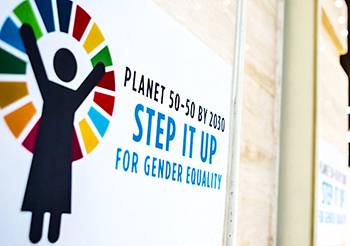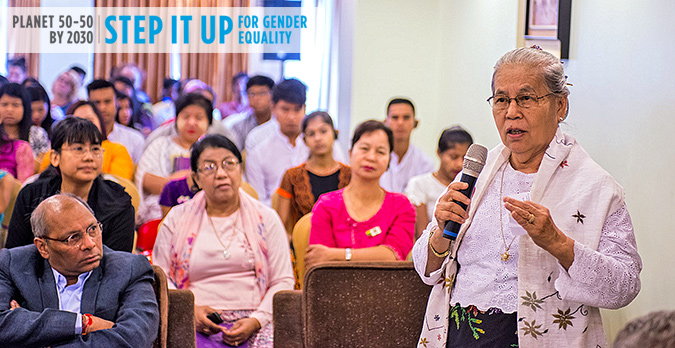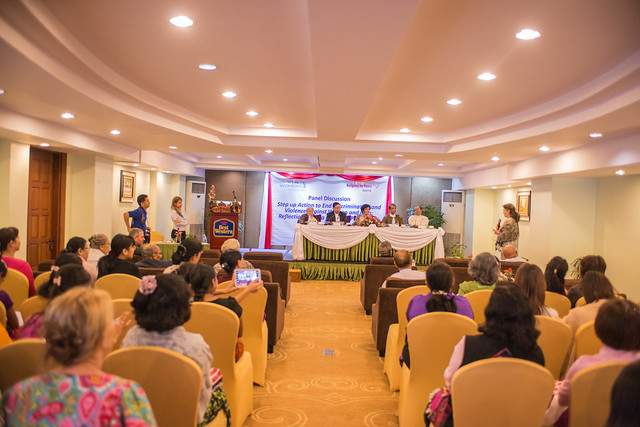Religions uphold the equality and dignity of women, religious leaders say in seminar organized by UN Women Myanmar
Date:
[Press Release]
Yangon, Myanmar – Prominent leaders of four religions in Myanmar have gathered together to jointly send out a clear message: No religion justifies discrimination or violence against women.

The Buddhist, Catholic, Muslim and Hindu leaders spoke at a 5 March panel discussion that UN Women organized with Religions for Peace Myanmar to celebrate International Women’s Day. About 120 people attended the half-day event in Yangon, including members of the four religious communities, the Myanmar National Human Rights Commission, UN agencies, and more than 40 local and international NGOs, as well as ambassadors and other senior officers of six embassies.
Religions for Peace Myanmar is part of a global coalition for multi-religious cooperation.
The discussion theme was, “Step up Action to End Discrimination and Violence against Women and Girls: Reflections from a Religious Perspective”. Quoting Scriptures and teachings, the four religious leaders said there was no question that all faiths uphold the equality and dignity of women.

Father Joseph Maung Win, Secretary General of Religions for Peace Myanmar, opened the discussion by saying that collaboration among all the religions is key to efforts to end discrimination and violence against women.
Quoting from the Catechism of the Catholic Church, His Eminence Cardinal Charles Bo, Archbishop of Yangon Archdiocese, said, “All persons enjoy equal dignity and fundamental rights in so far as they are created in the image of the One God, are endowed with the same rational soul, have the same nature and origin, and are called in Christ to the same divine beatitude.”
Speaking for the Buddhist community, Daw Tin Hlaing, Patron of Ratana Metta, said that respecting other people and living with them are key principles of Buddhism and women and girls should be empowered to pursue their full mental and physical well-being.
The large majority of Myanmar’s population is Buddhist.
Al Haj U Aye Lwin, Chief Convener of the Islamic Centre, said: “Both men and women are created from a single soul, according to Islam. They are complementary -- equal but not identical. Women have a right to choose their religion, life partner, to own property, to be educated. ... To treat women badly is a major sin in Islam.”
Responding to event participants who pointed to discrimination within religious communities, Al Haj U Aye Lwin said, “It is not religion that teaches discrimination. It is interpretation and practice that results in discrimination.”
The leader of the local Hindu community, Hla Tun, Coordinator of Sanatan Dharma Swayamsevak Sangh, said: “According to Hindu Scriptures, where women are honored, there will be auspiciousness. Women's well-being brings prosperity and happiness to the community.”
Hla Tun said the empowerment of women also empowers the social and economic development of the community as a whole – an idea that all the other panelists shared.
To address the problem, panelists and participants recommended raising awareness within and across communities of religious norms on the equality and dignity of women; investing in formal and non-formal education of women and girls; increasing women’s awareness of their rights and ability to exercise them; and empowering women economically and as leaders in society.
Jean D’Cunha, Head of UN Women Myanmar, wrapped up the session by speaking of the power of faith to effect change. She also stressed that discrimination and violence against women is not just “a woman’s issue,” but one that also hurts other members of society and a country’s overall development.
“Religious leaders with their strategic reach and influence, together with women and men laity, can draw on the transformative potential of religion to end discrimination and violence against women and girls and foster genuine peace and harmony,” she said. “For religion speaks to the core of our beings, and inspires our meaning systems and relationships, including relationships of gender justice and equality.”
While UN Women Myanmar has worked with religious communities, it was the first time it had organized an event with Religions for Peace Myanmar, a collaboration that will continue.
Photo Gallery
For more information:
Please contact: Grazia Giovanna Redolfi
Economic Specialist, UN Women, Yangon, Myanmar
Tel: 099 750 62463 Email: [ Click to reveal ]
